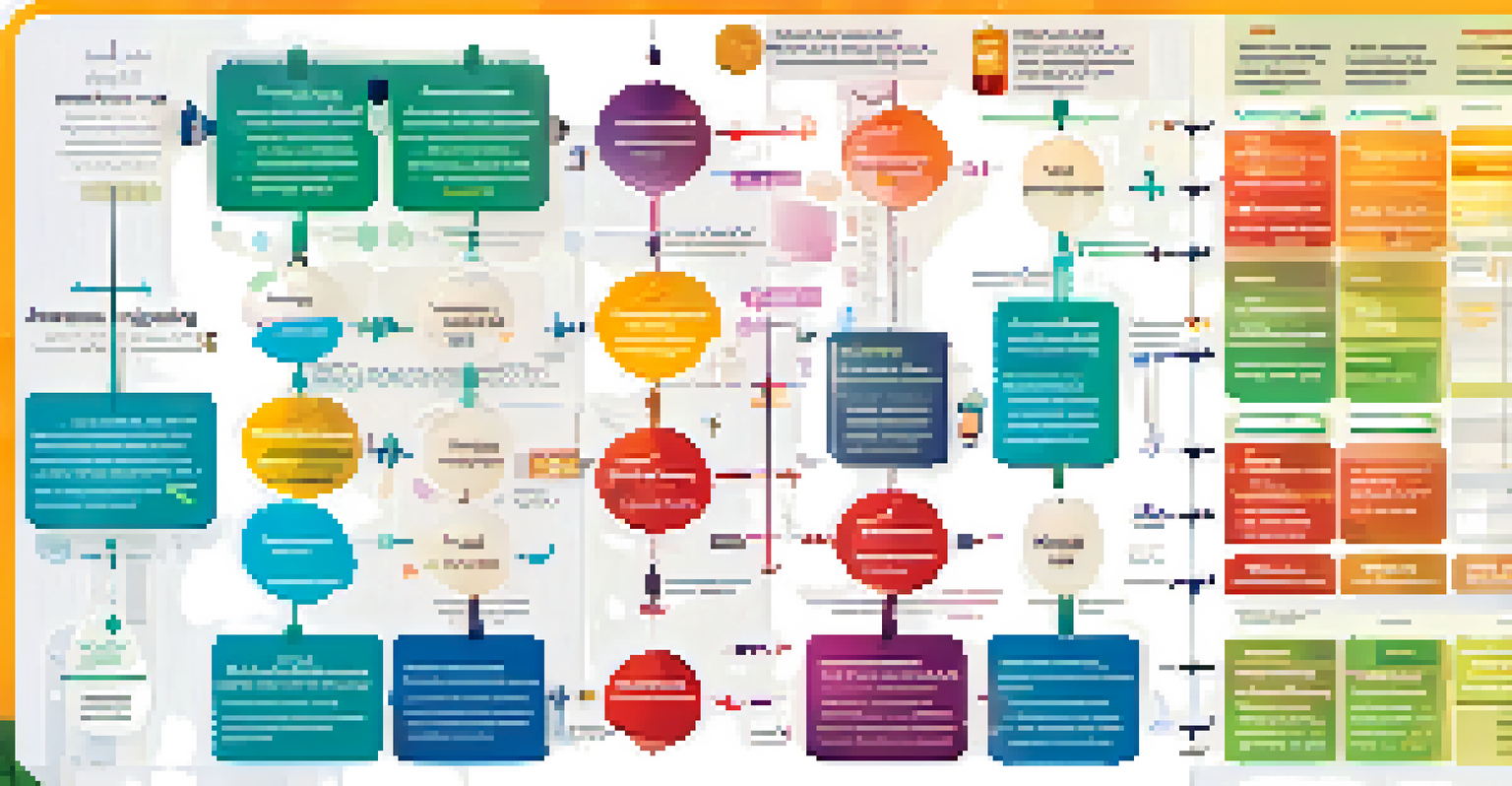How Pharmacogenomics Revolutionizes Drug Prescription Practices

Understanding Pharmacogenomics and Its Importance
Pharmacogenomics is the study of how genes affect individual responses to drugs. This innovative field merges pharmacology and genomics, offering insights into how our genetic makeup can influence medication efficacy and safety. By personalizing drug prescriptions based on genetic information, healthcare providers can significantly enhance treatment outcomes.
Pharmacogenomics is revolutionizing the way we think about medicine, offering a pathway to personalized treatment that can improve patient outcomes and reduce adverse effects.
Imagine a world where your doctor has a detailed roadmap of how your body will react to specific medications. This becomes possible with pharmacogenomics, allowing for tailored drug therapies that minimize adverse effects while maximizing their effectiveness. It’s like having a GPS for your health journey, guiding you towards the best treatment options.
As we continue to unravel the complexities of human genetics, pharmacogenomics stands out as a beacon of hope in medicine. It not only promises better health outcomes but also paves the way for more efficient healthcare systems by reducing trial-and-error prescriptions.
How Pharmacogenomics Changes Drug Prescribing Practices
Traditionally, drug prescriptions were often based on population averages, which could lead to ineffective treatments or harmful side effects. Pharmacogenomics flips this approach on its head by focusing on individual genetic profiles, ensuring that the prescribed medications are more closely aligned with a patient’s unique biology. This shift is akin to customizing a suit rather than buying off the rack.

For instance, a patient with a genetic variant that affects drug metabolism may require a lower dose of a certain medication due to the risk of toxicity. Conversely, someone with a variant that speeds up drug processing might need a higher dose for it to be effective. By leveraging these insights, healthcare providers can deliver safer and more effective treatments.
Personalized Treatments via Genetics
Pharmacogenomics personalizes drug prescriptions based on genetic information, enhancing treatment efficacy and safety.
As more genetic testing becomes available, the medical community is gradually adopting pharmacogenomic principles into routine practice. This transition not only helps in reducing adverse drug reactions but also enhances overall patient satisfaction, as individuals receive treatments that work best for them.
The Role of Genetic Testing in Pharmacogenomics
Genetic testing is a key player in pharmacogenomics, providing actionable data that informs prescribing decisions. These tests analyze specific genes that influence drug response, enabling healthcare providers to make informed choices about which medications are likely to work best for their patients. Think of it as a personal health assessment that unlocks a treasure trove of information.
The future of medicine is not one-size-fits-all; it's about tailoring treatment to the individual, and pharmacogenomics is at the forefront of this transformation.
For example, tests can identify variations in genes like CYP2D6, which is responsible for metabolizing many commonly prescribed drugs. Knowing a patient's genetic profile can help doctors avoid prescribing medications that may not be effective or could cause harmful side effects. This proactive approach can save time, money, and most importantly, improve patient health.
As genetic testing becomes more accessible and affordable, its integration into routine clinical practice is expected to grow. This evolution will not only enhance the precision of drug prescriptions but also empower patients to take an active role in their healthcare decisions.
Benefits of Pharmacogenomics for Patients
The benefits of pharmacogenomics extend far beyond personalized prescriptions. Patients can experience a significant reduction in the trial-and-error process often associated with finding the right medication. This means fewer visits to the doctor, less time spent dealing with side effects, and ultimately a quicker path to effective treatment.
Additionally, pharmacogenomics can lead to improved medication adherence. When patients understand that their treatment is tailored to their unique genetic makeup, they may feel more confident in their prescribed medications. This confidence often translates into better compliance and ultimately better health outcomes.
Genetic Testing Informs Prescriptions
Genetic testing provides critical insights that guide healthcare providers in selecting the most effective medications for patients.
Furthermore, as more patients benefit from pharmacogenomics, the healthcare system as a whole stands to gain. By reducing adverse drug reactions and improving treatment efficacy, we can expect lower healthcare costs and better resource allocation in the long run.
Challenges in Implementing Pharmacogenomics
While the potential of pharmacogenomics is enormous, there are challenges to its widespread implementation. One significant hurdle is the integration of genetic testing into routine healthcare practices. Many healthcare providers may not have the resources or training necessary to interpret genetic data effectively, which can hinder the adoption of these personalized approaches.
Another challenge lies in the regulatory landscape surrounding genetic testing and medication prescribing. Clear guidelines and standards are essential to ensure that pharmacogenomic data is used ethically and effectively. Additionally, patient privacy concerns must be addressed to foster trust in genetic testing.
Despite these challenges, the momentum for pharmacogenomics continues to build. Ongoing research, education, and collaboration among healthcare professionals, geneticists, and policymakers will be vital in overcoming these barriers and fully realizing the benefits of this revolutionary approach.
The Future of Pharmacogenomics in Medicine
The future of pharmacogenomics in medicine looks promising, with advancements in technology and research paving the way for more personalized healthcare. As genomic data becomes increasingly integrated into electronic health records, doctors will have easier access to this critical information during prescribing decisions. This could lead to a more seamless experience for both patients and healthcare providers.
Moreover, as our understanding of the human genome expands, we can anticipate the development of new medications tailored to specific genetic profiles. This could open the door to innovative treatments for various conditions, moving us closer to a future where personalized medicine becomes the standard rather than the exception.
Empowering Patients in Healthcare
Pharmacogenomics encourages patients to take an active role in their treatment decisions, fostering collaboration with healthcare providers.
The journey of pharmacogenomics has just begun, and its potential to revolutionize drug prescription practices is immense. As we embrace this shift in healthcare, we can look forward to a future where treatments are not just effective but are also designed with each individual's unique genetic makeup in mind.
Patient Empowerment Through Pharmacogenomics
One of the most exciting aspects of pharmacogenomics is its potential to empower patients in their healthcare decisions. By understanding how their genetics influence medication response, individuals can engage more actively in discussions with their healthcare providers. This collaborative approach fosters a sense of ownership over one’s health journey.
Patients equipped with knowledge about pharmacogenomics can advocate for themselves, asking pertinent questions about their treatment options. This empowerment not only enhances patient satisfaction but also encourages more informed decision-making, leading to better health outcomes.

As pharmacogenomics continues to gain traction, patients will increasingly find themselves at the center of their healthcare decisions. This shift represents a significant cultural change in medicine, moving from a one-size-fits-all approach to a more dynamic, personalized model of care.